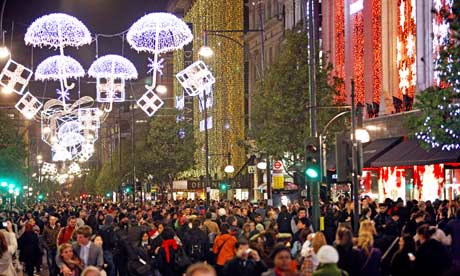It’s jingle tills time: there are just 15 shopping days to go until Christmas and, as retailers like to say at this time of year, it’s all to play for reports The Guardian.
The next fortnight will be make or break for some high street names. There are already behind-the-hand mutterings in retail circles about which chains might follow 2012 casualties such as Peacocks, JJB and Comet and not see 2013.
As the economic downturn continues, with wages lagging inflation, this festive season will be a financial strain for many. The new Which? Squeezeometer (yes, it really is called that) reckons 10.2m households are feeling the pinch and 1.5m are resorting to a payday loan or unauthorised overdrafts. But they are only cutting back Christmas spending by £30 each.
So how much will we spend? According to Which? an average UK household will splurge £634 to £835 on gifts, £161 on food and drink, and another £40 on festive paraphernalia such as cards and trees.
HSBC reckons the outlay will be £526 a head, with £374 going on gifts and more than a tenth of 18 to 24-year-olds using an overdraft to pay the bills
The Money Advice Service, however, has UK adults’ “mean spend” (a description of the average, rather than any Scrooge-like tendency) at £592 each. Multiply that by 49 million UK adults, it says, and the grand total of Christmas spending will be £29bn.
The one known known, is that consumers are leaving the Christmas splurge later every year. Shoppers are smart, and price comparison websites have made them even savvier. They now play an annual game of chicken with the high street, waiting as long as possible before making purchases in the hope that shopowners, worried about being left with stock they can’t shift, will slash prices. Retailers, meanwhile, hold out as long as they can to preserve their profit margins.
In recent years the shops have blinked first and the sales have started before Santa has even loaded his sleigh. There are already discounts on the high street and the chances are the retailers will lose this game again.
Data from the British Retail Consortium last week showed Christmas spending had got off to a slow start: retail sales in November were down 0.4%. A survey by Ipsos Mori suggested one in five shoppers planned to spend less this year than last, but looking on the bright side, the same number said they planned to splash out more.
There’s little sign of economic strife or battered consumer confidence at middle England’s retail destination of choice, John Lewis. The store chain, whose adverts have become a festive event to rival the Queen’s speech, raked in £142m through its shops and online last week – 15% up on the same time a year ago. Flying off the shelves, says JL, are the usual scarves, gloves and scanties along with tablets, headphones and traditional toys.
Andrew Murphy, John Lewis retail director, said: ” We are delighted to have achieved these new sales records, particularly in a market that is still economically challenging … It is great to see a really festive buzz in our shops.”
The biggest day for online shopping passed last Monday – now dubbed Mega Monday in the retail trade. The received wisdom is that shoppers spend all weekend browsing – both in stores and “sofa-surfing” through catalogues and online – deciding what to buy. Then, back in the office last Monday, they placed the orders. Some £10,000 a second whizzed through the broadband network, with peak traffic levels at lunchtime.
But a second surge in cybershopping was expected last night. Between 8pm and 9pm was, for some reason, forecast to be the biggest Christmas hour for shopping on tablets and mobile phones – “appy hour” the retailers rather excruciatingly called it. Mobiles, evidently, are better for secret shopping. Marks & Spencer was anticipating three hits a second on its mobile website as shoppers multi-tasked while watching the X Factor final.
The food retailers are still unsure which will be their busiest day – it could be Saturday 22 December or Christmas Eve – a vital 48 hours for anyone supplying fresh food such as turkeys, sprouts and seasonal trifles.
As one top supermarket boss said: “The problem people have is where to store the bird and all the other stuff they have to buy. You probably won’t have a fridge big enough to take the turkey, and won’t want to leave it in the garage to keep cool for four days. We still don’t know whether Saturday or Monday will be our busiest day.”
To spread the load, some of the big grocers fired off a letter to business minister Michael Fallon asking for a relaxation of the Sunday trading laws, which allow big stores to open for just six hours on the day of rest, asking for the same, longer hours they enjoyed throughout the Olympics. Bah, humbug! came the swift reply from Westminster.
M&S’s response to this rebuff is to open more than 100 of its stores – the ones with big car parks – at one minute past midnight on Christmas Eve. Bad news indeed, for the store’s staff, who only five years ago were told by previous boss Sir Stuart Rose they would not have to show up to man the tills on Boxing Day because “staff deserve a few days to relax with family”.


